 This October, the U.S. State Department reiterated its new policy on international drug enforcement: a more tolerant attitude towards different drug policies, and even outright legalization, in other countries. John Collins examines this new ‘Brownfield Doctrine’, named after William Brownfield, Assistant Secretary of State for the Bureau of International Narcotics and Law Enforcement Affairs. He looks at the international response to the new doctrine, writing that it will allow states time to innovate around drug policy at the same time debates over how best to reform international drug treaties continue to play out.
This October, the U.S. State Department reiterated its new policy on international drug enforcement: a more tolerant attitude towards different drug policies, and even outright legalization, in other countries. John Collins examines this new ‘Brownfield Doctrine’, named after William Brownfield, Assistant Secretary of State for the Bureau of International Narcotics and Law Enforcement Affairs. He looks at the international response to the new doctrine, writing that it will allow states time to innovate around drug policy at the same time debates over how best to reform international drug treaties continue to play out.
The US State Department recently restated a major shift in US drug diplomacy. At its core is the idea of allowing greater variation in international policies and the opportunity to develop new national innovations. Ambassador William Brownfield, Assistant Secretary of State for the Bureau of International Narcotics and Law Enforcement Affairs, recently summed up the idea:
Things have changed since 1961. We must have enough flexibility to allow us to incorporate those changes into our policies … to tolerate different national drug policies, to accept the fact that some countries will have very strict drug approaches; other countries will legalize entire categories of drugs.
This new ‘Brownfield Doctrine’ has provoked significant international policy discussion and debate.

What is the Brownfield Doctrine?
The Brownfield Doctrine is a framework for thinking about how to readjust international drug policy in the short term. It’s based on shifting enforcement priorities and allowing policy innovation via flexible interpretation of certain antiquated provisions of the international drug conventions. It’s derived from US constitutional principles around ‘purposive’ interpretations of legal texts rather than maintaining strict legalistic or ‘originalist’ interpretations. Ambassador Brownfield described this, similar to the US constitution, as viewing the treaties as ‘living breathing documents’ which should be interpreted via their preambulatory principles of protecting the ‘health and welfare of mankind’ instead of pedantic readings of outdated clauses. It is based on four points:
- Defend the integrity of the core of the conventions.
- Allow flexible interpretation of treaties.
- Allow different national/regional strategies.
- Tackle organised crime.
The international response
The response has been tentative and mixed. Member states of drug conventions are pushing ahead with it in many respects. For example the recent Organization of American States Special General Assembly on Drugs invoked principles derived from the doctrine. It has become particularly controversial within some circles because it’s a unilateral framework put forward by the former chief proselytizer and bully on international drug policy – the United States.
Regardless of who authored it, the four-point approach is on balance a sensible path forward for the immediate future and allows breathing room for innovation and changes in policy, which could become stalled in messy discussions around treaty reform. If a Latin American or a European country had authored the framework it would likely have received a warmer response; it just so happens to be from the US.
Many are justifiably wary of allowing states to redraw international agreements, seeing such a process as a slippery slope that might result in undermining other treaties such as human rights conventions. However, I think some realism is justified here.
Empirically, the level of adherence to international agreements varies drastically. In the field of drug control this has been a consistent theme. As the UK acknowledged as early as 1951, drug conventions had ‘frequently been more honoured in the breach than in the observance’. Whether states were called out on the inadequacies of their compliance had little to do with legal reasoning and everything to do with realpolitik. Turkey, for example, was publicly praised as a model licit (legal) opium cultivator, whilst being quietly criticized for allowing frequent leakages into the illicit market. Iran was either loudly condemned or quietly ignored for flouting the conventions, depending on its utility to the leading powers at the time. Afghanistan was frequently overlooked out of a recognition that enforcing the treaties was, as the Ministry of the Economy pointed out in 1950, ‘impossible’.
Meanwhile, altering international agreements, even if they prove misguided, is so minimal that greater flexibility is often required in their implementation. One of the key architects of the 1961 Single Convention on Narcotic Drugs, Herbert May, argued in 1955 that a central goal of the Convention was to provide ‘greater flexibility’ to the international system due to the likelihood of changed circumstances as well as medical-scientific innovations and research. The fact that the Single Convention took fourteen years, three drafts and an extremely rancorous plenipotentiary conference to negotiate should give pause to those who think redrafting is an immediate goal. The outcome of the Single Convention process was a breakdown in international drug diplomacy as the US set about torpedoing the document, viewing it as too weak relative to predecessor treaties. Thereafter member states struggled to agree on its interpretation, and it took two separate drafts to produce the Commentary which purports to explain it.
The downsides to the State Department’s policy
I have already discussed the human rights aspects. Some argue that the Doctrine doesn’t go far enough and allows for repressive approaches to be continued and that it’s a tool to hide US ‘violation’ of treaties around cannabis, while the US continues to enforce the parts of the war on drugs it wants. Further they question why the US should get to set out the terms for global drug policy reform or debates.
I think these arguments miss the point. Firstly the Brownfield Doctrine is what states make of it. If they use it to develop innovations around policy, which improve the global approach to drugs and make the repressive model empirically unjustifiable, then I think it can be extremely positive, especially if it can be used to forward discussions on treaty reforms. If, on the other hand, it is used to ignore broader issues about drug policy reform, then I think it will be a negative. It will be up to civil society and reform-minded states to hold other member states’ feet to the fire on this, but ultimately I think the opportunities drastically outweigh the dangers.
Secondly, it’s very hard to argue that the US is flat-out ‘breaching’ the treaties. The Federal Government is the executor of the treaties and national legislation is unchanged. The Federal Government also has no ability to force states to criminalise marijuana. They could use federal resources to enforce federal laws, but that would result in a drastic reshaping of state-federal relations. The real implications of the Brownfield Doctrine therefore fall on less powerful states. Uruguay has a far tougher time explaining its decision to legalise cannabis in the context of the drug treaties, but the Brownfield Doctrine essentially says that the US and other states will allow them breathing room while the debates around treaty reform play out. To me that seems like a rational approach to a difficult question.
Thirdly, there is nothing in the treaties which mandates the current ‘war on drugs’ approach. There are certain legislative actions which adherence to the treaties require, but the level of resourcing is entirely up to states as is their implementation. The ‘war on drugs’ was a national and bilateral creation, facilitated by multilateral forums, such as the UN. To end the ‘war on drugs’ requires a rollback on various diplomatic, regional, national and local fronts. In the immediate term very few of these relate to the drug treaties. Further, evidence of efficacy around alternative policies is the best inoculation against states continuing the repressive model. In the future, increasing pluralism in international drug policies will likely render the treaties unsustainable, and that is when treaty rewriting will likely become inevitable.
Fourthly, no member state is yet advocating rewriting the documents. Multilateral cooperation on any issue is hard to create. When it is created, the goal of member states becomes to sustain it, even in the face of variance in implementation and interpretation. The Brownfield Doctrine is just the application of this fact to the field of drug policy. The most rational reform strategy seems to me one which pushes the doctrine as far as practicable and uses it to hold the US to a standard of non-intervention outside its borders. When sufficient national level reforms have taken place, then issues around treaty reforms will become more apparent and practical, but there needs to be a sequential action process here.
What would treaty reform look like?
I’ve never heard a treaty reform process elaborated convincingly. Some argue that an open debate would provide the answers. Given the very real economic and structural interests underpinning the current system, that seems unlikely. Many describe the treaty system as a ‘prohibitionist regime’. The implication is that it’s a monolithic legal framework, created to enforce a global prohibitionist model and therefore treaty reform is fundamentally required to change it. That’s a useful conceptual term, but it’s ahistorical and the reality is far more complicated.
It’s a system which has overseen an array of regimes throughout its history, often running concurrently. Some outlived their usefulness and simply died out. For example, in the 1930s the drug control system encompassed many regimes, including a regime around regulating global drug manufacturing; one around minimizing illicit trafficking; another around prohibiting opium smoking (which many states including Britain ignored out of deference to local security concerns in their colonies) and a regime around developing regulations on production (again happily ignored by many states when it conflicted with economic interests). These aspects intersected in various ways at national, regional and international levels, but were far from monolithic.
The implementation of the UN system from the 1970s onwards was overwhelmingly characterized by an extreme implementation of prohibitionist aspects of the treaties. For certain states it was driven by the US outsourcing its control efforts, particularly in Latin America. But for many others it was driven by state level responses to a domestic problem. For example, Asia was an epicenter for the prohibitionist model, not a recipient. The colonial powers stalled implementing prohibition as long as they could, recognising the dangers of the illicit market as well as for fiscal reasons. Post-colonial Asian elites associated opium and the opium monopolies with colonialism and cultural backwardness and enthusiastically embraced strict prohibitionist models. These drives towards prohibitionist and repressive models were facilitated by the treaty system but not necessarily driven by it. The implication is that they can be drastically rolled back without any treaty revision.
The weak regulatory ‘core’ of the treaty system
The current treaty system is essentially a regulatory framework for a global licit market in opioid medications (such as morphine) for the treatment of severe pain. To enforce this market it mandates certain action around prohibiting non-medical production and manufacturing of these medicines. It was believed that effective regulation of the licit market would squeeze out illicit supplies, leaving a minimal role for prohibitionist aspects and police enforcement. This proved profoundly misjudged. When the failures of the regulatory approach to quell the illicit market became apparent, international policy path determinacy fuelled an exponential growth in enforcement efforts, thereby creating the modern ‘war on drugs’.
Ultimately the core represents a weak regulatory framework and will need to be updated. For example, it was based on postwar principles of central economic planning that have since been discredited. As a result 83 percent of the world has virtually no access to essential pain medicines. However, reforming this core is a very difficult question which we haven’t even started to grapple with. The economic interests involved are legion also and unlikely to welcome a reopening of the trading arrangements locked into the system. Focusing all efforts on reforming the language around the limbic prohibitionist aspects would, in my opinion, be a wasted opportunity. Instead, the goal should be to roll back prohibition as far as possible and develop our understanding of regulating previously illicit markets – as is happening with cannabis – via flexible interpretations and innovations. When the beginnings of a consensus around reforming the core of the conventions becomes apparent, states can also put the final nail in the coffin of the war on drugs by writing all remnants out of the international treaties.
Featured image: Opium fields in Afghanistan Credit: isafmedia (Flickr, CC-BY-2.0)
Please read our comments policy before commenting.
Note: This article gives the views of the author, and not the position of USApp– American Politics and Policy, nor of the London School of Economics.
Shortened URL for this post: http://bit.ly/1tuVypa
_________________________________
 John Collins – LSE International History
John Collins – LSE International History
John Collins is a PhD Candidate in the Department of International History at the London School of Economics, and Coordinator of the LSE IDEAS International Drug Policy Project. His research focuses on Anglo-American relations and international drug control over the period 1939-1964. Specifically, his work seeks to locate the issue of drug control both within the context of evolving Anglo-American relations, and the Cold War more broadly. He tweets at @john_collins1.







Dear John Collings,
Law Enforcement Agains Prohibition has already created a draft for a new Single Convention Of Drugs treaty. See here: http://www.leap.cc/uploads/2014/03/LEAP_UN_Treaty_Amendment_2.26.1421-1.pdf
Regards,
Gerhard
Thanks for this John. I agree with a lot of your analysis but differ on a few fundamentals. I dont see how prohibition can be regarded as an ‘antiquated provision’ of the treaties. Aside from regulating medical uses, prohibition wasand remains their core function; they are essentially prohibitionist legal instruments. To me the idea that doing something so fundamentally contrary to prohibition as legalisation could ever be allowed within any ‘flexible interpretation’ is not a sustainable argument for the US or anyone else. Its actually as absurd as saying torture is allow under a flexible interpretation of the convention against torture. Decriminalisation, arguably yes. Legalisation – definitely not. On that basis I also disagree that there is any reasonable case to make that the US are somehow not breaching the treaties. They clearly are – by any reading of the law, and as claimed by the treaty bodies of the UNODC, and INCB. The reality of breach has to be the starting point in the debate moving forward
Its certainly welcome that the US are talking about the problems with the treaties and showing willingness to accept the reality of experiments with regulation models that challenge the prohibitionist international framework. But the US can’t have their cake and eat it on this issue – you can’t breach a core treaty framework and try and maintain its integrity at the same time. The US breach (and the Uruguay breach) are the clearest challenge yet to the fundamentally punitive prohibitionist nature of the drug treaties – the US needs to acknowledge this and lead the debate on treaty reform instead of hiding from it with spurious legal arguments about flexibility. Trapped between the impossible challenges of enforcing federal law in the reform states, or pushing a new treaty system through congress – they have apparently opted for a legal fudge to try and keep the discussion on treaty refrom off the tabel for as long as possible – at least for the UNGASS.
They should own and justify the breach instead of denying it. For once, its a case they can reasonably make – this is a US treaty breach that has occurred for very good reasons, namely that the old prohibitionist system is dysfunctional and redundant – and new approaches are needed to protect the health and welfare of citizens. The drug treaties are not written in stone; as you say, with all laws they contain mechanisms for their reform and modernisation when needed. That need has clearly arrived
The challenge to the drug treaty framework that the US and other breaches represents can and should act as a catalyst for meaningful debate and reform of an outdated and broken system. Modernisation of the international system to make it fit for purpose is something the US should embrace, not shy away from or try and finesse its way around with untenable and messy legal interpretations If the US are serious about pursuing the wider health, human rights and development goals of the UN, or specifically the drug treaty goals of preserving the ‘health and welfare of mankind’ they need to acknowledge that the a prohibitionists treaty framework is no longer fit for purpose – if it ever was. Nothing could demonstrate this more clearly than their own overt breach of its core prohibitionist tenets. Ironically, the current US position does not preserve the ‘integrity’ of the treaties atall. Failure to reform them will simply render them increasingly marginalised and redundant’. The way to preserve their integrity is to reform them so they achieve the UN’s wider goals.
Unlike the US, the reform movement can have our cake and eat it on this one – we can encourage principled breaches to improve local policy outcomes, and we can encourage an active multilateral debate and reform process at the same time. The two do not need to be sequential and are not mutually exclusive – quite the opposite.Countries no longer need the permission o the US to explore legalisation – that time has passed, and as such the Brownfield doctrine is symbolically significant but largely irrelevant to geopolitical reality. My sense is we shouldn’t buy into it as some huge concession – its actually a political excuse and delaying tactic that we should simply exploit to accelerate a treaty reform process by highlighting how broken and absurd the system is now shown to be.
Not a specific response to this piece, but a very different and more detailed analysis of the concept of dynamic interpretation (aka ‘living’ treaties) and the US position on the drug conventions was published today on the Opinio Juris international law blog
http://opiniojuris.org/2014/12/18/guest-post-us-just-called-unilateral-interpretation-multilateral-obligations/#more-31427
This piece should have received more attention, I consider the analysis very correct and the years since it was written have only but confirmed it. It is surprising to read comments mentioning that “prohibition was and remains their core function [of the treaties]; they are essentially prohibitionist legal instruments” while there is little evidence for that in the treaties themselves. Their interpretation as prohibitionist instruments makes no doubt, but one particular interpretation should not refrain from looking onto the text. Doing so reveals that prohibition is present as a marginal provision, an escape clause. It is certainly not present at the core of the treaties: they are not the “drug prohibition treaties” but the “drug control treaties”, they do not mention prohibition in the statement of intention contained in the preamble nor in resolutions and final acts. The treaties themselves contain very little mention of the term “prohibition” (or similar ones, e.g. interdiction, ban, etc.) and all mentions are circumcised to specific situations, detailed, and up to national policy choices. There is no obligation or mandate to prohibit whatsoever, anywhere. Finally, a look at the preparatory works of the different treaties shows how initial proposals for an indeed central prohibition were consistently and repeatedly ruled out, and are not present in final treaties. Both textual and intention-based reading of the treaties questions their interpretation as “prohibitionist instruments” at their core.
It is regretful that these elements are not considered by scholars, but luckily, Mr. Collins makes a critically relevant exception.